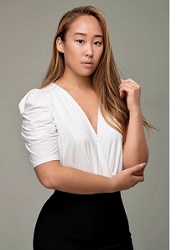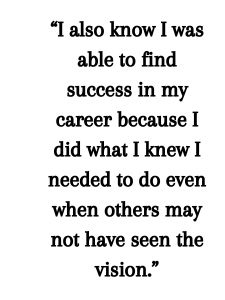
 Rachel Maeng Brown, the CEO and Founder of GEN Agency,
has been a pioneering force in bridging the gap between student
athletes and the world of content creation. Honored as one of
Crain's New York "20 in their Twenties" in
Entrepreneurship and Sports in 2021, and more recently as an "AHN Unsung Hero", Brown has been
reshaping the landscape of marketing, partnerships, and content
creation for college athletes through her agency's innovative
program, Athletes
Turned Creators. What sets her apart is not only her visionary
approach but also her own experience as a former Big Ten
student-athlete, providing a unique understanding of the challenges
and opportunities in this evolving space.
Rachel Maeng Brown, the CEO and Founder of GEN Agency,
has been a pioneering force in bridging the gap between student
athletes and the world of content creation. Honored as one of
Crain's New York "20 in their Twenties" in
Entrepreneurship and Sports in 2021, and more recently as an "AHN Unsung Hero", Brown has been
reshaping the landscape of marketing, partnerships, and content
creation for college athletes through her agency's innovative
program, Athletes
Turned Creators. What sets her apart is not only her visionary
approach but also her own experience as a former Big Ten
student-athlete, providing a unique understanding of the challenges
and opportunities in this evolving space.
______________________________
What has your journey from student
athlete to influencer to entrepreneur been like?
Being a student-athlete in a power conference helped me understand
how to work under pressure. The biggest skill I learned from my time
at Rutgers was time management! I competed on the Women’s Rowing
team and was in several different executive roles in campus
organizations. I always had somewhere to be and was always working.
This is exactly how my days look now – I have pitch meetings,
project building, events, and working with clients constantly!
Have you found that being an Asian American woman has
affected your career in any way, positive or negative?
I believe I’ve been able to turn a lot of situations positive. I not
only find myself as the only Asian American in the room but many
times the only young woman of color. My intersectional diversity has
given me perspective when I work with others. I find myself able to
create success in many situations and this has helped me maneuver
through my career. Although I don’t often see many people that look
like me in the places I work, I believe I can show young Asian
Americans (especially women) they can work in any industry THEY
choose.
Where did the idea for GEN Agency come from?
The largest age group of the audience on social media is GenZ. Our
creators have the largest influence over this age demographic. This
new time period of social media marketing is also changing
generations to come – the age of social media users gets younger and
younger as technology and information becomes more accessible. The
agency strives to make an impact on this generation’s audience,
influencers, and athletes.
What is your NIL (Name, Image, Likeness) Education program? And
what special challenges do student athletes face when it comes to
becoming content creators?
Our program Athletes Turned
Creators helps all sides of the NIL economy understand
influencer marketing. The NCAA’s
NIL rule allows student-athletes to use their influence as top
athletes to market product and services to fans, aspiring athletes,
and local campuses. Student-athletes, however, have much different
responsibilities than many influencers. As a former Big Ten
student-athlete, I had multiple practices or lifts a day, classes,
mandatory study hall hours, team and academic meetings, along with
taking time outside of practice for recovery. Because of this, it’s
harder for athletes to meet content deadlines. They also have no
previous influencer marketing education – they didn’t have to grow
their platforms the same way social media influencers did. When
handing over video instructions, legal and financial documents, they
need more step-by-step explanations. Brands/Collectives/Marketplaces
need to take these things into account when planning a campaign.

In your experience, what are some common mistakes made or
obstacles faced by creators when it comes to branding and social
media presence?
Creators often feel alone in their work, even with all the followers
they have. A large group of influencers began content-creating
during COVID and many live in different places all over the country,
if not the world. Although they have other friends that are
creators, it’s hard for people who are not part of the industry to
understand the pain points. A lot of creators don’t live with other
people they create content with, so they have to talk virtually
and/or plan out trips to be with them! It’s hard not to have like
minded people working around you.
How important is authenticity and
storytelling as an influencer, and how do you help your clients
develop and maintain real connections with their audiences?
When working with brands, creators need to authentically integrate
the brand into their content. If the brand does not match the
creators’ content-topic, audience, or their beliefs, it will be
obvious on the creator’s page! Social media followers are much more
aware that creators get paid through brand partnerships to promote
products or services, etc. Although they can identify an ad, the
creator needs to make the video feel as if the viewer is not being
served an ad. When selecting brand collaborations, we walk creators
through the content ideation and filming to make sure it fits within
their niche!
What is a typical day like for
you?
Most of my days are filled with pitch meetings for upcoming brand
campaigns, researching the current market of campaigns, staying
updated with leaders in the marketing and sports space, and
attending in-person events, conferences, and premiers with our
creators/clients!
What advice would you give to those looking to enter the
sports and entertainment industry?
1. Keep going! You will get a lot of rejection in the industry.
There are more people interested in getting into the industry than
there are jobs for them. Because the market is oversaturated, people
above you may be going for the job you are qualified for on paper.
That’s okay!! You will get a role if you keep working towards
growing your skill set and finding your way in.
2. Network! We’re always told to network but, you really need to get
out of your comfort zone and reach out to people. Relationships are
what help you get jobs. After meeting people, you need to continue
to reach out and create a relationship with them so you stay on
their “short list”.
3. If you want it, you can do it. I was adopted to a Caucasian
family. Unlike a lot of other Asian Americans, I wasn’t pushed into
a certain major or career. I decided on what I wanted to pursue and
found a way to do it. I believe that if you want to become an
entrepreneur or work in a less-stable industry you should be able
to. I also know I was able to find success in my career because I
did what I knew I needed to do even when others may not have seen
the vision.